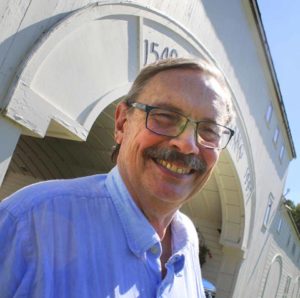WE’RE ALL IN THIS TOGETHER
The Only Constant Is Change
By LARRY BENNETT • Special to www.AllOTSEGO.com
Once we are born, every moment of every day brings change. We are born biologically complete, yet with little else to our beings. We can’t speak, walk, or talk.

As a baby, then in our youth, in our teens, maybe even through our twenties, we live through endless and often tumultuous changes. Every day offers fresh knowledge and new experiences.
Our parents first teach us. Then other teachers bring more ideas. New ideas and feelings bring hope, fear, desire, doubt. New relationships bring new views of the world.
We develop knowledge and self-awareness. We experience gains and losses, ups and downs, and come to accept ongoing change as part of our lives.
Yet by our thirties most of us have established a reasonably well-defined life – a life with work we chose, a partner we chose, friends we chose, a place to live we chose, religious beliefs or non-beliefs we chose. We chose preferred literary, music, and movie genres.
We have probably chosen to belong to certain groups: civic organizations, trade organizations, recreational organizations, and others. We have reached a point where we don’t have to keep changing – we have chosen our place in the world.
We have likely even chosen political affiliations. Even if we don’t actively join in partisan political activities, if we want to vote we must describe ourselves to the voting registrar as a Democrat, Republican, or as a member of some other party. If we want no formal party attachment, we still have to write down Independent or Unaffiliated, even as we lean one way or the other.
Ongoing polls of American voters since 1974 show consistently and significantly lower voter turnout in younger people and higher turnout in older people. Since elections are extolled as the best means to peaceful change, and since the older we get the less receptive we are to change, it seems we could expect voting to be more appealing to younger voters. But the reverse is true.
•
Why do more older folks vote than younger folks? Is it a tradition the older generation upholds? Do older folks have more time on their hands? Do young people move so often they are effectively disenfranchised, or don’t stay long enough to establish a voting habit?
r is the fact that they are often renters make them feel less connected to a community and therefore feel less of a need to vote? Or are they simply absorbed in getting their lives off to a good start?
What if the idea of voting no longer signifies a gilded avenue to desired change for young people, but instead offers a burning roadblock to unwanted change for older people? It can be argued this is where we are and where we appear to be heading.
The voting cry to “Make America Great Again” is clearly about repealing the changes of the last 50 years – be they women’s equal rights, voting rights, LBGTQ rights, or many other rights.
While those who proclaim MAGA are of all ages, it turns out that those who actually vote MAGA also skew older, just as voters do on the other side of the political chasm.
What does this mean for our futures? Will more and better education turn those young MAGA-prone kids into liberal voters as they get older? Will the continuing flight from rural to urban areas by young people of all backgrounds offer opportunities to liberalize their attitudes?
Or will they progress from nonvoting MAGA-chanting youths to older MAGA folks who will habitually vote against any kind of progressive change? Or will the eventual disappearance of Trump put out all their fires?
Based on the state of our politics, the future of our nation seems unknowable. The old ironic curse, “May you live in interesting times,” seems to apply.
Still, there are dozens of theories about our destination – pick one and see where it goes. If you find you can deduce and predict the voting patterns of the next decade or two, you can rule our politics.

